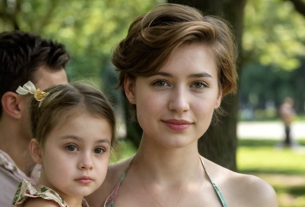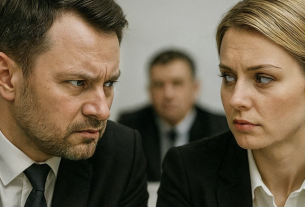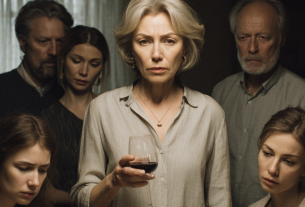The shadows had already fallen long and thick when the bus—having made its daily run from the dusty, noisy city to the quiet rural backwater—hissed to a stop on its pneumatics by the familiar post with the peeling blue sign. The door opened, and she stepped down. Katerina. The weariness of a twenty-hour shift as an orderly at the city hospital lay on her shoulders like heavy lead, echoing as a dull ache in her lower back. The air, saturated with the scent of freshly cut grass and the smoke from stove pipes, was the first balm to her tormented soul.
And he was the second.
He stood there as he always did, day after day, year after year. His tall, powerful figure seemed to have grown into that spot by the stop, becoming an inseparable part of it, a living landmark. Yegor. Seeing her, his face—usually stern and focused—lit up with an inner light, so warm and complete that even the evening dusk seemed to recede.
Silently, with a familiar, almost chivalrous tenderness, he took her battered work bag from her hands. Their fingers met for a moment, and that fleeting touch was enough to wash away part of her fatigue. They set off along the dirt road leading to the house—their house. Unhurried, in step, their footfalls beat out a quiet, steady melody of shared existence.
“What a handsome couple,” one of the village gossips murmured, with a sigh laced with a hint of spite, as they warmed themselves on the bench by the sun-soaked wall. “Our Yegor—why, he’s like a hero from a folk tale, those broad shoulders, that steady gaze. And her… a proper beauty, even if the years aren’t what they were. And where does she find the strength, after shifts like that—she all but glows.”
“Well, Katerina sure got lucky—must’ve used some love charm,” the second chimed in, squinting after them. “Snagged herself a younger one. They’ve been together how many years now, and he still can’t get his fill of looking at her, as if she’d fallen from the moon. And they’re no match, look at them—he’s younger by what, ten years? More!”
Katerina’s neighbor and bosom friend Valya, a woman with a quick tongue and a kind heart, couldn’t hold back.
“Olga Petrovna, Maria Semyonovna—will you ever calm down? Aren’t you tired of wagging your tongues? Ten years they’ve lived like two peas in a pod. Ten! And with every day our Katerina only grows younger and lovelier beside her husband, while you’ll soon crumble to dust from your own spite and poverty of spirit. If you must be jealous, do it quietly!”
By then Katerina and Yegor were far away and didn’t hear the usual hum. They walked on, her hand resting in his strong palm, his shoulder a dependable support she could lean on at any moment.
Fifteen years earlier, her life had been not a road but an impassable, boggy trail that sapped her last strength. Back then she wasn’t “Katerina,” but the belittling “Katya, the drunk’s wife.” Her first husband, once a strapping lad, had dissolved entirely in the bottle. At first she fought back—poured out the liquor, pleaded, wept, hid the money. In return came cuffs and bruises, spittle-flecked insults, and the complete destruction of everything she was trying to hold together—family, respect, her own dignity.
The last straw was the evening he, not finding his stash for booze, smashed her mother’s favorite vase and, growling, raised a hand to his own son. That very night, gathering his meager belongings, she shoved him over the threshold of their half-ruined little house that could hardly be called a home. “Go to your parents, to your mama. You’re no husband—you’re a burden.” He left for the city and soon vanished, as so many had before him.
Two children stayed with her: fifteen-year-old Pavel, in whose eyes teenage absolutism had been replaced by a bitter, adult sense of responsibility, and eleven-year-old Masha, a fragile girl with frightened eyes. They weren’t to blame for her choosing the wrong man in her youth. And Katerina swore to herself that they wouldn’t merely survive. They would live. With dignity.
She was a country woman, flesh of this soil’s flesh, and she knew: the earth never betrays, never deceives; it feeds those who do not fear work. She took up the axe that had once been her husband’s and learned to split wood. The heavy, stubborn logs wouldn’t yield at first, and the blisters bled. But she kept chopping. She expanded the garden until it was the size of a field and planted it all with potatoes. She bought a sow with her last money, and soon the yard filled with the cheerful grunting of piglets. A cow, chickens, turkeys—this all became her small kingdom, which she ruled alone. She didn’t quit her city job—money was desperately needed.
Her son Pavel became a man early. Shoulder to shoulder with his mother he hauled sacks, mended the fence, and cut hay. Their house, once crooked and dreary, slowly began to change. They patched the roof, put in new windows where the sun could shine. They bought a secondhand pickup—there’s no running a farm without wheels. Katerina herself got behind the wheel, drawing surprised looks from the villagers.
Life, slowly and with a creak, was getting back on track. Evening out. The wounds were scarring over.
Three years later, Pavel was drafted into the army. His absence left a gaping hole, an emptiness, and the physical loss of her main helper. Sometimes she hired day laborers, but the main burden lay on her own shoulders—slender, yet unbending.
Pavel returned more mature, grown, with a steady gaze. He found work at an agribusiness set up on the former collective farm lands by a new owner—a man strict but fair to the locals.
And then one summer evening a friend came to visit Pavel. A fellow soldier from the neighboring village—Yegor. Tall, but alarmingly thin, with large, light eyes that were somehow incredibly sad.
“Poor thing—must not be fed well at home,” Katerina thought with motherly tenderness as she set the table.
“She’s… beautiful. And her eyes are tired, but kind,” Yegor thought of her, and the thought made him shy and hot.
From then on Yegor became a frequent and welcome guest. He seemed to sense where a man’s strength was needed—he’d straighten the fence, help with the haying, figure out the pickup’s engine. Katerina rejoiced: “What a reliable friend Pavel has—a golden fellow.”
But slowly her feelings began to change. In her soul, long asleep to anything but caring for her children and the homestead, something tremulous, forgotten, youthful stirred. She caught his gaze and looked away, feeling her cheeks blush treacherously. And in his light eyes the same hidden sadness appeared more and more often, ripening into an unspoken question.
He began to come less often. And it grew ever harder for her to chase away the insistent, unsettling thoughts of him. They pretended nothing was happening, but in those rare moments when they were alone, the air between them turned electric; they were at a loss, not knowing what to do with their hands or what to talk about. She was forty, yet her heart beat like a sixteen-year-old’s, and a strange, sweet melody rang in her head.
With time this new, tender, frightening bond between the “young ones” became obvious to everyone. A village is like a glass aquarium: everything is seen, everything is heard, everything is chewed over from every side.
Yegor’s mother and sisters were furious. “She’s old enough to be your mother! Shame on you! Found yourself a floozy with baggage!” they hissed. The hardest talk awaited Yegor with Pavel. The friend called his friend to the riverbank, away from curious eyes and ears.
“What does this mean, Yegor?” Pavel asked, his voice quiet and dangerous. “My mother. Explain yourself.”
“I love your mother, Pash,” Yegor said frankly, without looking away. “I love her. As a woman. As the best, strongest, and most beautiful woman in the world.”
It ended in a fight. A man’s fight—brutal, but clean. They pounded each other in silence, beating out of their heads the mothers’ shrieks and the neighbors’ gossip. In the end, sitting on the ground, battered and bruised, both suddenly laughed through the blood on their lips. The anger was gone; only a taut yet sturdy thread of understanding remained.
“Enough of sneaking around like pups,” Pavel rasped, getting to his feet. “Go on home already. But mind you”—he turned and jabbed a finger into his friend’s chest—“if I see even one tear on my mother’s face, I’ll kill you. Don’t expect mercy. And I’m not calling you Dad,” he added with a laugh.
Yegor moved in with Katerina. Half the village gasped. Everything was good—almost perfect. But sixteen-year-old Masha, her little girl, rebelled. To her, twenty-year-old Yegor was a traitor, an intruder upon the memory of her father—even if he had been a scoundrel, he was still her own. She stopped speaking to them, slammed doors, was rude. They endured it. They loved her and waited. Masha calmed down only when she herself fell truly, madly in love and got married. Only then did she understand that love has no age and happiness no bounds.
Soon Pavel married too, a good, even-tempered girl. Life went on.
And then the most incredible thing happened. Katerina realized she was expecting a child. At forty-three. The world turned upside down. The irony of fate was striking: her daughter-in-law was at the same term. They began going to their checkups together, drawing the doctors’ surprise and fond smiles.
At last the day came. They lay in the same hospital ward—mother-in-law and daughter-in-law—holding hands and laughing through tears at the sheer improbability of it all. Katerina delivered first—a sturdy, healthy boy they named Misha. Two days later her daughter-in-law gave her a grandson—little Styopa.
These events stirred the village anew with unheard-of force. The gossip reached its peak, but now there was more wonder and delight in it than malice.
Katerina and Yegor finally went to the registry office. Until then she had always refused, laughing it off.
“What do we need stamps in our passports for? You won’t get away from me anyway!” she joked.
“I want to be your lawful husband. Completely and officially,” he insisted.
They registered quietly, without fuss. Coming out of the registry office, he pulled her close and whispered, “Now it’s forever, Katyusha.”
They walked along the same road as ten years before. He—tall, strong, her hero. She—still slender, smiling, made younger, with shining eyes. Her work bag swung in his hand, and in her heart there beat a late, hard-won, yet so full and undivided happiness.
Let some judge and others rejoice. There are two of them. They are together. And that is what matters.



